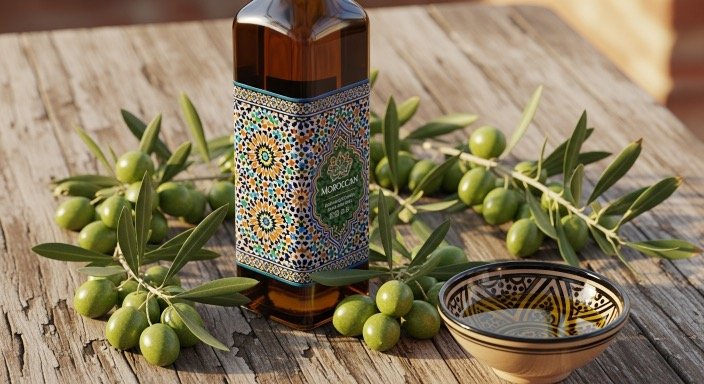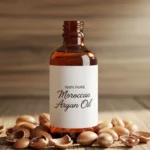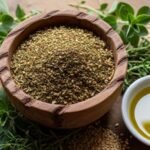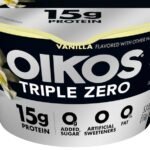Let’s talk about something that’s been called “liquid gold” for centuries — Moroccan olive oil.
If you’ve ever drizzled olive oil on a salad or used it for cooking, you probably already know it’s one of the healthiest fats around. But not all olive oils are created equal — and Morocco happens to produce some of the purest, most nutrient-dense olive oil in the world.
What makes Moroccan olive oil so special? It’s not just the flavor — it’s the unique combination of climate, traditional extraction methods, and antioxidant power that set it apart. This oil isn’t just a kitchen staple; it’s a nutritional powerhouse backed by science.
In this article, we’ll explore why Moroccan olive oil stands out, how it supports your health, and how to choose the best one for your table.
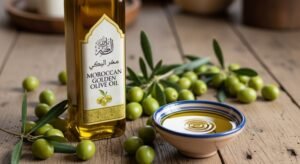
A Legacy of Health: The Moroccan Olive Oil Tradition
Olive oil production in Morocco dates back over 2,000 years, and the tradition is deeply rooted in Mediterranean culture. The country’s sun-soaked hillsides and mild winters create the perfect growing environment for olive trees, especially the famous Picholine Marocaine variety.
These olives are hand-picked and cold-pressed — a method that preserves nutrients and minimizes oxidation. This is crucial because heat and chemicals can destroy the polyphenols and antioxidants that give olive oil its powerful health benefits.
According to the My Olivea, cold-pressed extra-virgin olive oils (EVOOs) like Morocco’s retain the highest levels of monounsaturated fats, vitamin E, and polyphenols — the compounds that fight inflammation and protect your cells from damage.
Read also: Healthy Banana Bread Recipe: The Guilt-Free Treat You’ll Actually Love
Nutritional Profile of Moroccan Olive Oil
Let’s break down what makes Moroccan olive oil a nutrition superstar per tablespoon (about 14 g):
| Nutrient | Amount | Benefit |
| Calories | ~120 | Energy source |
| Monounsaturated fats | 10–11 g | Heart-healthy fats |
| Polyunsaturated fats | 1 g | Essential fatty acids |
| Vitamin E | 1.9 mg | Skin & cell protection |
| Polyphenols | 200–500 mg/kg | Anti-inflammatory antioxidants |
These components work together to support everything from cardiovascular health to skin elasticity and brain function.
1. Heart Health and Cholesterol Balance
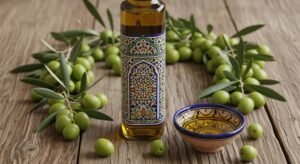
One of the strongest reasons Moroccan olive oil is praised as one of the world’s healthiest is its impact on heart health.
According to Harvard Health Publishing, monounsaturated fats (the main type in olive oil) help reduce LDL cholesterol(the “bad” kind) while raising HDL cholesterol (the “good” kind).
The high level of polyphenols in Moroccan olive oil also helps prevent oxidative stress, which contributes to atherosclerosis — the hardening of arteries. In simple terms, it keeps your blood vessels flexible and your heart strong.
2. Anti-Inflammatory and Antioxidant Power
If inflammation is the root of most chronic diseases, Moroccan olive oil might just be your body’s best defense.
The polyphenols in this oil, especially oleuropein and hydroxytyrosol, have been shown to lower inflammatory markers in the body.
A study in the National Library of Medicine found that regular consumption of extra-virgin olive oil reduced inflammation comparable to ibuprofen — without the side effects.
That means Moroccan olive oil doesn’t just make your food taste better — it can also support your immune system, joint health, and long-term cellular protection.
3. Supports Brain Function and Memory

The brain thrives on healthy fats — especially monounsaturated ones. Moroccan olive oil is rich in oleic acid, which protects brain cells from oxidative stress and helps maintain strong neural connections.
Research from National Institute of Aging links olive oil consumption with lower risks of Alzheimer’s disease and cognitive decline. The antioxidants in the oil reduce inflammation in brain tissue, helping improve mental clarity and memory retention over time.
4. Promotes Healthy Skin and Hair
Moroccan olive oil isn’t just for eating — it’s a beauty secret too. Its high content of vitamin E and squalene helps moisturize and protect skin from UV damage.
Many Moroccan women have used it for generations as a natural moisturizer and hair treatment. Its antioxidants neutralize free radicals, helping to reduce early signs of aging.
You can even mix a drop of extra-virgin Moroccan olive oil with your night cream or apply it directly to dry areas for hydration.
5. A Boost for Digestive and Gut Health
Olive oil plays an important role in digestive wellness. It stimulates bile production, which helps your body absorb nutrients from food more effectively.
According to NIH , the healthy fats in olive oil also support gut microbiome balance, encouraging the growth of beneficial bacteria.
And because Moroccan olive oil is minimally processed, it’s gentler on the stomach than refined oils, making it a great choice for anyone with digestive sensitivities.
Also read: Can Dry Eyes Cause Blindness? Here’s What You Should Know
6. Helps Regulate Blood Sugar
If you’re managing blood sugar levels, this oil can help. Moroccan olive oil’s combination of healthy fats and polyphenols slows carbohydrate absorption, keeping glucose levels steady after meals.
A study published in Diabetes Care found that people who added olive oil to their meals had lower blood sugar spikes than those who didn’t. That makes it a smart choice for people with insulin resistance or pre-diabetes.
7. Protects Against Chronic Diseases
Regular consumption of Moroccan olive oil may lower the risk of diseases such as:
- Type 2 diabetes
- High blood pressure
- Certain cancers (especially colon and breast)
- Arthritis
The credit goes to antioxidants and healthy fats working in synergy to reduce inflammation and oxidative stress — both underlying causes of these conditions.
8. Cooking With Moroccan Olive Oil

There’s a common misconception that olive oil shouldn’t be heated. The truth? High-quality Moroccan olive oil has a smoke point of around 410°F (210°C), which is higher than many realize.
That means it’s safe for:
- Sautéing vegetables
- Roasting meats and fish
- Baking healthy treats
Just avoid deep-frying or exposing it to extremely high temperatures for long periods — that’s when the beneficial compounds start to break down.
(Tip: Drizzle it on your banana bread or roasted veggies before serving — it adds flavor and boosts absorption of fat-soluble vitamins.)
9. How to Choose Authentic Moroccan Olive Oil
With so many olive oils on the market, authenticity is key. Here’s what to look for:
- Label: Choose “Extra Virgin” and “Cold Pressed.”
- Origin: Look for “Product of Morocco” or “Bottled in Morocco.”
- Packaging: Dark glass bottles protect against light damage.
- Harvest Date: Fresher is better — ideally within 12–18 months.
- Certifications: Moroccan olive oil cooperatives often carry PDO (Protected Designation of Origin) certification.
Buying directly from trusted Moroccan producers ensures purity and quality.
10. Sustainability and Ethical Production
Morocco’s olive farms are known for sustainable agriculture. Many producers use eco-friendly irrigation systems, organic fertilizers, and traditional hand-picking methods that preserve biodiversity.
Supporting Moroccan olive oil means supporting communities that rely on these centuries-old traditions — especially women’s cooperatives that play a vital role in olive oil production and fair trade.
Final Thoughts
When it comes to oils that nourish your body from the inside out, Moroccan olive oil truly earns its reputation as one of the healthiest in the world.
From improving heart health and brain function to boosting digestion and supporting radiant skin, it’s a simple, versatile addition to your diet with impressive long-term benefits.
Next time you’re shopping for olive oil, look for the rich golden-green hue and peppery aroma of Moroccan extra-virgin olive oil — your body (and your taste buds) will thank you.

